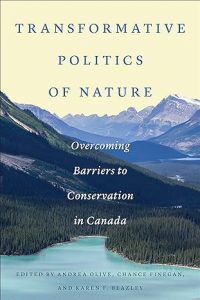
Transformative Politics of Nature: Overcoming Barriers to Conservation in Canada
Transformative Politics of Nature highlights the most significant barriers to conservation in Canada and discusses strategies to confront and overcome them. Featuring contributions from academics as well as practitioners, the volume brings together the perspectives of both Indigenous and non-Indigenous experts on land and wildlife conservation, in a way that honours and respects all peoples and nature.
Contributors provide insights that enhance understanding of key barriers, important actors, and strategies for shaping policy at multiple levels of government across Canada. The chapters engage academics, environmental conservation organizations, and Indigenous communities in dialogues and explorations of the politics of wildlife conservation. They address broad and interrelated themes, organized into three parts: barriers to conservation, transformation through reconciliation, and transformation through policy and governance.
Taken together, the essays demonstrate the need for increased social-political awareness of biodiversity and conservation in Canada, enhanced wildlife conservation collaborative networks, and increased scholarly attention to the principles, policies, and practices of maintaining and restoring nature for the benefit of all peoples, species, and ecologies. Transformative Politics of Nature presents a vision of profound change in the way humans relate to each other and with the natural world.

Protecting the Prairies: Lorne Scott and the Politics of Conservation
Grasslands are among the richest, most biodiverse ecosystems on the planet, and they are crucial in the fight against climate change. Unfortunately, since 1970 Canada has lost more than 40 percent of its grasslands, and less than 15 percent of Saskatchewan’s grasslands exist today. The province has some of the highest CO2 and methane emissions per capita and virtually no environmental regulations. How did we allow the grasslands to become one of the most endangered ecosystems on Earth?
In some sense, the story of Saskatchewan fits rather neatly into the larger story of Western Canada, where politicians often care more about extraction and growing the economy while destroying the very things the economy depends on. But that isn’t the whole story.
Much like Canada’s universal health care, Saskatchewan is also the birthplace of some of the first provincial and national conservation laws, and home to an unsung and unlikely champion for the environment: a farmer with a twelfth-grade education and a really old van.
In Protecting the Prairies, Andrea Olive provides a history of wildlife and land conservation in Saskatchewan told through the life story of environmentalist, naturalist, farmer, and former Minister of Environment and Resource Management Lorne Scott. This is a book that challenges and inspires us to be stewards of the environment in our own backyards and communities, and above all, to never be complacent when it comes to protecting the natural world.
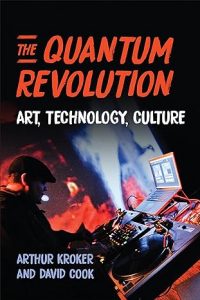
The Quantum Revolution: Art, Technology, Culture
We are currently riders of the information storm. AI fascinates us, images mesmerize us, data defines us, algorithms remember us, news bombards us, devices connect us, isolation saddens us. Deeply embedded in digital technology, we are the very first inhabitants of life in the quantum zone. The Quantum Revolution is about life today – its entanglements, creativity, politics, and artistic vision.
Arthur Kroker and David Cook explore a new way of thinking drawn directly from the quantum imaginary itself. They explain the quantum revolution as everyday life, where technology moves fast, and where, under cover of the digital devices that connect us, the most sophisticated concepts of technology and science originating in mathematics, astrophysics, and biogenetics have swiftly flooded human consciousness, shaped social behavior, and crafted individual identity. The book discusses the concept of the quantum zone as a new way of understanding digital culture, and presents stories about art, technology, and society, as well as a series of reflections on art as a gateway to understanding the quantum imaginary. Richly illustrated with sixty images of critically engaged photos and artwork, The Quantum Revolution privileges a new way of understanding and seeing politics, society, and culture through the lens of the duality that is the essence of the quantum imaginary.

Deciphering the Genome of Constitutionalism: The Foundations and Future of Constitutional Identity
Constitutional identity has become one of the most important and hotly contested concepts in contemporary constitutional theory and practice. It has been repeatedly invoked in debates concerning EU integration, constitutional reform and revolution, and the spread of ethno-nationalist populism, democratic backsliding, and constitutional retrogression. Yet, the concept’s precise foundations, meaning, scope, and dynamics of continuity and change remain somewhat unclear and under-explored. This contemporary and definitive volume aims to address this stark gap. Featuring some of the world’s leading scholars of comparative constitutionalism, constitutional theory, and constitutional politics, this book provides a comprehensive, first-of-its-kind theoretical, comparative, normative, and empirical account of the concept of constitutional identity. It will be of great interest to scholars, students, jurists, and constitutional drafters alike.
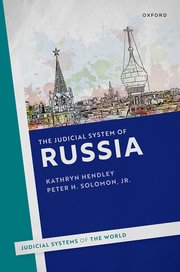
The Judicial System of Russia
The Judicial System of Russia paints a portrait of the courts of the Russian Federation under Putin, how they work in practice, and what shapes the behaviour of its judges. It stresses the dual nature of a judicial system, where ordinary cases are for the most part handled fairly, but where cases of interest to powerful persons are subject to influence–a common situation in authoritarian states. In so doing, the authors trace the origins of some contemporary practices to the Soviet past, but also identify novelties. They pay close attention to the struggles of reformers to make the courts fairer and more efficient, along with the measures taken to ensure that judges conform to the expectations of their political masters. This means dealing with the evolution of judicial governance, including the selection, promotion, and disciplining of judges.
In studying the actual operation of the courts, the authors take a socio-legal approach, emphasizing how different players (petitioners, respondents, lawyers, prosecutors, accused, judges) behave and why. This means dealing with the full gamut of courts from justices of the peace through the Supreme and Constitutional Courts and analysing their conduct in ordinary civil disputes, criminal cases, business disputes, administrative justice (claims against state officials), and constitutional matters. The authors also examine the relation of the public to the courts, including its readiness to litigate disputes despite generally negative views of the courts.
This analysis of the administration of justice in Russia covers both the Constitutional Amendments of 2020 and developments relating to the first months of the 2022 War in Ukraine. It is a must read for academics, practitioners, and all those with an interest in comparative courts and Russia’s judicial system.
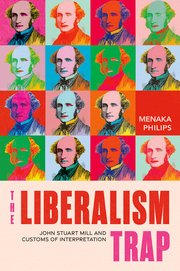
The Liberalism Trap: John Stuart Mill and Customs of Interpretation
Arguments about liberalism’s meanings, endurance, imminent death, or revival are widespread in modern political thought. But what effect do these preoccupations with liberalism have on the way political questions are taken up?
In The Liberalism Trap, Menaka Philips argues that the focus on liberalism has become a customary limit on our political imaginations. To examine the costs of that custom, Philips turns to John Stuart Mill-the so-called paradigmatic liberal. As she argues, Mill’s famed liberal status is habitually substituted for his political arguments such that the now standard association of Mill with liberalism determines how and why he is read. Philips, however, takes a break from that ready association. Her comparative reading of Mill’s work concerning women’s emancipation, class reform, and the British Empire recovers a thinker guided not by the ideological certainties he is often made out to represent, but by a politics of uncertainty-a politics which generated radical, gradualist, and paternalist strategies throughout his proposals on domestic and imperial questions.
By reading Mill against the limits of liberalism, Philips draws out the possibilities and risks of Mill’s own political practice, while inviting a critical evaluation of the customs of interpretation that shape contemporary political thought.

We, the Data: Human Rights in the Digital Age
A rallying call for extending human rights beyond our physical selves—and why we need to reboot rights in our data-intensive world.
Our data-intensive world is here to stay, but does that come at the cost of our humanity in terms of autonomy, community, dignity, and equality? In We, the Data, Wendy H. Wong argues that we cannot allow that to happen. Exploring the pervasiveness of data collection and tracking, Wong reminds us that we are all stakeholders in this digital world, who are currently being left out of the most pressing conversations around technology, ethics, and policy. This book clarifies the nature of datafication and calls for an extension of human rights to recognize how data complicate what it means to safeguard and encourage human potential.
As we go about our lives, we are co-creating data through what we do. We must embrace that these data are a part of who we are, Wong explains, even as current policies do not yet reflect the extent to which human experiences have changed. This means we are more than mere “subjects” or “sources” of data “by-products” that can be harvested and used by technology companies and governments. By exploring data rights, facial recognition technology, our posthumous rights, and our need for a right to data literacy, Wong has crafted a compelling case for engaging as stakeholders to hold data collectors accountable. Just as the Universal Declaration of Human Rights laid the global groundwork for human rights, We, the Data gives us a foundation upon which we claim human rights in the age of data.
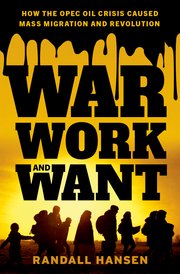
War, Work, and Want: How the OPEC Oil Crisis Caused Mass Migration and Revolution
An expansive history of how an economic shock a half century ago created a world that is addicted to mass migration.
The oil shock of 1973 changed everything. It brought the golden age of American and European economic growth to an end; it destabilized Middle Eastern politics; and it set in train processes that led to over one hundred million unexpected–and unwanted–immigrants.
In War, Work, and Want, Randall Hansen asks why, against all expectations, global migration tripled after 1970. The answer, he argues, lies in how the OPEC Oil crisis transformed the global economy, Middle Eastern geopolitics and, as a consequence, international migration. The quadrupling of oil prices and attendant inflation destroyed economic growth in the West while flooding the Middle East with oil money. American and European consumers, their wealth drained, rebuilt their standard of living on the back of cheap labor–and cheap migrants. The Middle East enjoyed the benefits of a historic wealth transfer, but oil became a poisoned chalice leading to political instability, revolution, and war, all of which resulted in tens of millions of refugees. The economic, and migratory, consequences of the OPEC oil crisis transformed the contours of domestic politics around the world. They fueled the growth of nationalist-populist parties that built their brands on blaming immigrants for collapsing standards of living, willfully ignoring the fact that mass immigration was the effect, not the cause, of that collapse.
In showing how war (the main driver of refugee flows), work (labor migrants), and want (the desire for ever cheaper products made by migrants) led to the massive upsurge in global migration after 1973, this book will reshape our understanding of the past half-century of global history.
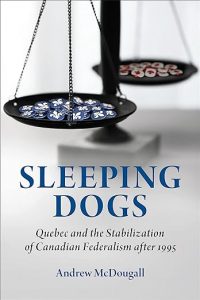
Sleeping Dogs: Quebec and the Stabilization of Canadian Federalism after 1995
What happened to the Quebec sovereignty movement after 1995? In Sleeping Dogs, Andrew McDougall reveals how a change in federalist strategy, combined with an improving political context, helped Canada stabilize its federal system and bury the “Quebec question” for the foreseeable future.
The book identifies five potential reasons the Quebec sovereignty movement lost momentum and argues that all contributed to a political environment that benefited federalists. McDougall explores topics of elite accommodation, generational change, changing identity politics, economic globalization, and constitutional fatigue. He argues that Canada’s federalist political elites have capitalized on these developments to stabilize the country by dropping the national question – even when they might still hold very different visions of the Constitution. Building on “constitutional abeyance” theory, the author conceives of this strategic change as the restoration of a constitutional abeyance among federalist actors. Considering recent history in light of subsequent developments, Sleeping Dogs is a timely and important attempt to understand the evolving situation in Quebec and Canadian federalism.

“We Are in Charge Here”: Inuit Self-Government and the Nunatsiavut Assembly
Powerful, innovative Indigenous self-governance regimes are increasingly important players in Canadian politics, but little academic work has been done on their structure, operation, and effectiveness. “We Are In Charge Here” examines the central institution of the most populous Indigenous self-governance regime in Canada, the elected Assembly of the Nunatsiavut Government.
Nunatsiavut – “our beautiful land” in Inuktitut – was established in 2006 by a modern treaty between the Labrador Inuit and the Canadian state. Graham White offers a thorough observation of the Assembly, based on interviews with Assembly members and others involved in Nunatsiavut politics, observation of Assembly sessions, and a review of official documents, in order to provide a comprehensive picture of the Assembly, its members, and its operations. The book examines the Assembly’s effectiveness in performing traditional legislative functions such as representation, policy making, and accountability. It addresses key concerns including executive-legislative power relations, Inuit influence on Assembly operations, and the Assembly’s role in realizing self-government.
Illuminating the intersection of Indigenous self-governance approaches and Western institutions, “We Are In Charge Here” will be of interest to political leaders, legislative officials, and academics concerned with the design and on-the-ground functioning of Indigenous self-government.